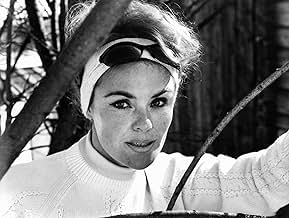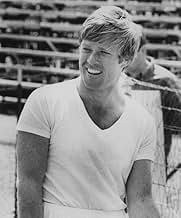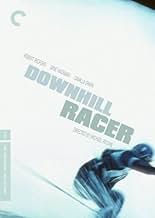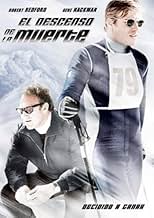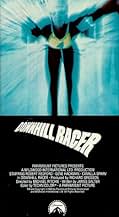IMDb RATING
6.3/10
5.7K
YOUR RATING
Quietly cocky David Chappellet joins the U.S. ski team as downhill racer and clashes with the team's coach, Eugene Claire.Quietly cocky David Chappellet joins the U.S. ski team as downhill racer and clashes with the team's coach, Eugene Claire.Quietly cocky David Chappellet joins the U.S. ski team as downhill racer and clashes with the team's coach, Eugene Claire.
- Won 1 BAFTA Award
- 1 win & 5 nominations total
- Director
- Writers
- All cast & crew
- Production, box office & more at IMDbPro
Featured reviews
Redford gives a low-key performance as a thoroughly unlikable member of the US Ski Team in the late 1960's, and he doesn't become any more likable as the story unfolds. Perhaps that's why the film gets such mixed reviews. The Olympic and racing sequences have an almost-documentary look to them, and for good reason. The story goes that IOC officials refused permission for the film crew to shoot during the actual Olympic events; the producers got around that inconvenience by giving hand-held cameras to cast members so they could shoot crowd scenes and background footage on the sly. It's hard to like David Chappellet, and making him a more sympathetic character might have been easier, but I think it's a much better story as-is. As we know all too well these days, world-class athletes aren't always aren't always the charming heroes we'd like them to be.
The appeal of a ski film to those who ski is obvious. But imagine yourself innocent of skiing. Can it hold the attention of the rest of us? Roone Arledge and his "Wide World of Sports" provided one answer, as Jean Claude Killy and his successors skied into American living rooms on many winter Saturdays. "Downhill Racer" seconds the motion.
The late Mike Ritchie, who'd essayed nothing more ambitious than commercials, traveled the World Cup circuit in the 1967-68 winter, accompanied by Aspen novelist Jim Salter, whose screenplay (from Oakley Hall's very different novel) effectively was written in segments the night before each shoot. Almost everything about this production was improvised.
Athletes are not necessarily interesting people. Killy was; stories about him, some even true, are legion. David Chappellet (a young Robert Redford), more typically, reminds one of the astronauts in "2001", with their limited range of expressions and nothing particularly interesting to say. This comes across powerfully in several hilarious interview scenes, with American and European journalists trying in vain to get the young man to say something worth writing down.
Wengen, Switzerland passes for several World Cup race sites. (A Swiss medico wears an armband identifying him as "Arzt", or doctor, at a supposed French venue). The filmmakers also were present in Grenoble for the Winter Olympics, providing a fictional inside look at the Games far different from that of, for example, "Chariots of Fire".
One still doesn't ski, but the pleasures of "Downhill Racer" are undeniable.
The late Mike Ritchie, who'd essayed nothing more ambitious than commercials, traveled the World Cup circuit in the 1967-68 winter, accompanied by Aspen novelist Jim Salter, whose screenplay (from Oakley Hall's very different novel) effectively was written in segments the night before each shoot. Almost everything about this production was improvised.
Athletes are not necessarily interesting people. Killy was; stories about him, some even true, are legion. David Chappellet (a young Robert Redford), more typically, reminds one of the astronauts in "2001", with their limited range of expressions and nothing particularly interesting to say. This comes across powerfully in several hilarious interview scenes, with American and European journalists trying in vain to get the young man to say something worth writing down.
Wengen, Switzerland passes for several World Cup race sites. (A Swiss medico wears an armband identifying him as "Arzt", or doctor, at a supposed French venue). The filmmakers also were present in Grenoble for the Winter Olympics, providing a fictional inside look at the Games far different from that of, for example, "Chariots of Fire".
One still doesn't ski, but the pleasures of "Downhill Racer" are undeniable.
Downhill Racer is about Olympic skiing, but it's also about American society, and about how sport gives the illusion of being an escape from the loneliness of being undereducated.
Dave Chappellet (Robert Redford) grew up in the isolation of rural Colorado, where the career option after high school is working on a ranch or going to Denver to take a hairdressing course. His talent on skis has earned him a call to the US national ski team as a replacement after one of the members fractures his leg in a European race. When he arrives in Germany after what seems to have been his first airplane flight, he meets his new roommate, a Dartmouth graduate, one of several team members from that same Eastern undergraduate world.
Chappellet remains cautious and defensive as he tries to navigate the manners, attitudes, and values of the team and of the European civilization he encounters. He's made even more prickly by the code of team play which he's required to accept from his demanding coach, Eugene Clair (Gene Hackman). Clair believes that good sportsmanship and team solidarity are the basis for success in international skiing, and that's important because success is what will achieve financial support for the team from American business. But Chappellet refuses to play the sportsmanship game - partly because he knows he can't speak the Ivy League language his teammates have mastered, and partly because he knows that winning is the only way he'll stay on the team, and Clair's concept of sportsmanship won't help him win, any more than would the attitude or values of Chappellet's embittered father back in Colorado. Dave Chappellet know he's going to have to ski his own race, always.
Downhill Racer features a variety of exciting ski races filmed and edited with great skill, and they reveal very powerfully that, in the midst of all the thousands of spectators, each skier is alone on the mountain, and that winning comes from a combination of relentless focus and arbitrary fortune. With this truth presented so clearly and compellingly, Chappellet's refusal to play his coach's game is validated. On race day he has to ski faster than anyone else. No one else can help him. And neither will membership in the right club (or school, or social background). He has to do it on his own.
But being on your own is very lonely. Chappellet begins to want to belong, and chases after a kind of club membership in Europe, pursuing the very attractively worldly Carole Stahl (Camilla Sparv), executive assistant to a German ski manufacturer. He catches her because he's becoming famous, and thus useful, but discovers that he's not important to her. He's a pleasant diversion, but he can be discarded as easily as a pair of gloves. He receives praise from his coach, but only after winning races. Until he wins, he's the target of Clair's angry lectures about not thinking of the good of the team. Hackman's strangled speech and look of frustrated disgust as he berates the uncooperative Redford for having taken an unacceptable risk after practice create a high-water mark in American film acting, as does the surly self-centredness of Redford's response.
At the end of the movie, narrowly dodging defeat in the most important race in his career, Chappellet is hoisted on the crowd's shoulders in a frozen moment of apparent triumph. But only one value exists - winning. And his win is already history. There's no love in it, no acceptance more profound than his coach's praise, the crowd's shouts of excitement. And tomorrow's winner is already eyeing him in an unspoken challenge. Dave Chappellet is going to be skiing down this mountain alone for the rest of his life.
Looking back across nearly forty years to watch this excellent film, we can already begin to hear the question asked by Robert Redford's character in The Candidate, "What happens next?" The answer may be bleak - more competition, more loneliness - but the film helps us discover the answer in a fascinating way, because it puts us on those skis, rushing at impossible speed down the mountain, in a cocoon of our own heartbeats, our own laboured breathing. We're forced to ask ourselves, "Would we make the team? Would we win? And if we did, would it mean anything?"
Dave Chappellet (Robert Redford) grew up in the isolation of rural Colorado, where the career option after high school is working on a ranch or going to Denver to take a hairdressing course. His talent on skis has earned him a call to the US national ski team as a replacement after one of the members fractures his leg in a European race. When he arrives in Germany after what seems to have been his first airplane flight, he meets his new roommate, a Dartmouth graduate, one of several team members from that same Eastern undergraduate world.
Chappellet remains cautious and defensive as he tries to navigate the manners, attitudes, and values of the team and of the European civilization he encounters. He's made even more prickly by the code of team play which he's required to accept from his demanding coach, Eugene Clair (Gene Hackman). Clair believes that good sportsmanship and team solidarity are the basis for success in international skiing, and that's important because success is what will achieve financial support for the team from American business. But Chappellet refuses to play the sportsmanship game - partly because he knows he can't speak the Ivy League language his teammates have mastered, and partly because he knows that winning is the only way he'll stay on the team, and Clair's concept of sportsmanship won't help him win, any more than would the attitude or values of Chappellet's embittered father back in Colorado. Dave Chappellet know he's going to have to ski his own race, always.
Downhill Racer features a variety of exciting ski races filmed and edited with great skill, and they reveal very powerfully that, in the midst of all the thousands of spectators, each skier is alone on the mountain, and that winning comes from a combination of relentless focus and arbitrary fortune. With this truth presented so clearly and compellingly, Chappellet's refusal to play his coach's game is validated. On race day he has to ski faster than anyone else. No one else can help him. And neither will membership in the right club (or school, or social background). He has to do it on his own.
But being on your own is very lonely. Chappellet begins to want to belong, and chases after a kind of club membership in Europe, pursuing the very attractively worldly Carole Stahl (Camilla Sparv), executive assistant to a German ski manufacturer. He catches her because he's becoming famous, and thus useful, but discovers that he's not important to her. He's a pleasant diversion, but he can be discarded as easily as a pair of gloves. He receives praise from his coach, but only after winning races. Until he wins, he's the target of Clair's angry lectures about not thinking of the good of the team. Hackman's strangled speech and look of frustrated disgust as he berates the uncooperative Redford for having taken an unacceptable risk after practice create a high-water mark in American film acting, as does the surly self-centredness of Redford's response.
At the end of the movie, narrowly dodging defeat in the most important race in his career, Chappellet is hoisted on the crowd's shoulders in a frozen moment of apparent triumph. But only one value exists - winning. And his win is already history. There's no love in it, no acceptance more profound than his coach's praise, the crowd's shouts of excitement. And tomorrow's winner is already eyeing him in an unspoken challenge. Dave Chappellet is going to be skiing down this mountain alone for the rest of his life.
Looking back across nearly forty years to watch this excellent film, we can already begin to hear the question asked by Robert Redford's character in The Candidate, "What happens next?" The answer may be bleak - more competition, more loneliness - but the film helps us discover the answer in a fascinating way, because it puts us on those skis, rushing at impossible speed down the mountain, in a cocoon of our own heartbeats, our own laboured breathing. We're forced to ask ourselves, "Would we make the team? Would we win? And if we did, would it mean anything?"
Well filmed, almost documentary style look at the world of Alpine skiing (aside from bizarrely over-dramatic music at times). The skiing scenes are generally exciting to watch, and get better as the film goes on. The acting is also good in a purposely muted way, with Redford trying to play against type as a driven but strangely detached individual, who has sublimated his entire personality in the desire to be a champion. Perhaps as a result of this 'hero', watching the film is never all that stimulating. Afterwards, one appreciates the intelligence of the acting and directorial choices made and the effect of certain scenes - the hero with his dreary dad or the girl back home, the new 'fashionable' girl who is more selfish than him, they way he shuts her up when she tries to 'gently' ditch him, the coach with one eye on the profits to be made but humane enough to care about his team. The ending is particularly memorable, designed to make us question the very cliche of wanting the hero to be the winner. In that respect (underlying irony) it shares something with other Michael Ritchie films I have seen- The Candidate and Smile. Just not as much fun maybe.
In this film, Robert Redford plays David Chappellet a young man training on a ski team with hopes of making the Olympics. The film is basically a character study of a somewhat narcissistic, shallow, self-centered guy from a simple rural background who dreams of attaining fame and fortune by entering the Olympics as a downhill racer. Throughout the film we see examples of his failure to connect with people. He visits his dad on his ranch and is received with complete coldness and indifference. He pulls into town and picks up an old girl friend, takes her for a ride and they have sex. Afterwards, he completely ignores her when she tries to tell him about her life. He pursues Camilla Sparv who plays the beautiful Carole Stahl. In her, he has met his match. She seems to be someone who also uses people, never lets them get very close and always has an agenda to get what she wants. She works for a ski manufacturer who seems to use her to bait the young up and coming skiing stars that he seeks to groom for product advice and future endorsements. She is narcissistic, shallow and self-centered like him but she is also elusive. This plays to the competitor in him and she knows that. Throughout the film we see Gene Hackman who plays the skiing coach Eugene Claire. We witness numerous scenes where Chappellet ignores his advice and counsel, where the coach calls him on his arrogance and selfish attitude. But in the end, they triumph and seem to be headed for the Olympics. But in the last brief scene, victory and fame seems so fickle, elusive, short lived, it all seems superficial. Redford is wonderful in this and of course, Gene Hackman is just as good. Seeing these two early in their careers, that alone makes this a film worth watching.
Did you know
- TriviaTen days before filming began, star Robert Redford accidentally drove a snowmobile over a cliff, tearing his tendon and requiring seven stitches in his knee.
- GoofsTires don't squeal on snow, yet Dave manages this when driving the Porsche.
- ConnectionsFeatured in Siskel & Ebert & the Movies: Robert Redford (1992)
- How long is Downhill Racer?Powered by Alexa
Details
- Release date
- Country of origin
- Languages
- Also known as
- Cuesta abajo
- Filming locations
- Sankt Anton am Arlberg, Austria(Arlberg-Kandahar World Cup race)
- Production companies
- See more company credits at IMDbPro
Box office
- Budget
- $1,600,000 (estimated)
Contribute to this page
Suggest an edit or add missing content



